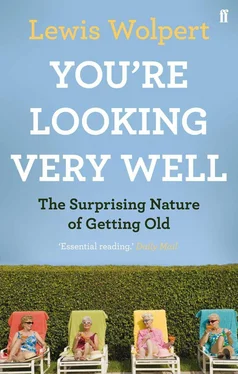The Employment Equality (Age) Regulations 2006 gave an employee approaching 65 the right to ask to continue working, but an employer can refuse without any explanation. The age regulations do not require an employer to give a reason for a refusal to grant an employee’s request to continue working; the obligation is only to consider the request, to follow the correct procedures in relation to adhering to the time limits, and hold a meeting with the employee to discuss the matter. Some 25,000 are forced out of work each year for this reason. The Horndal effect shows how useful and competent older workers can be: production at a steel mill in Sweden went up 15 per cent as workers aged, with annual output per worker increased steadily for 15 years with no additional investment.
When the UK government scrapped the mandatory retirement age for civil servants from April 2010, they were lauded for being progressive. It would have been hypocrisy to send 65-year-old civil servants home for good, while the House of Commons was, before the recent general election packed with 89 MPs over the retirement age of 65. People over 60 are more active than ever before, and it is only right that the state recognise this. Many of the votes that keep MPs in office are from the over 65s. The House of Lords is often referred to as Britain’s most expensive retirement home, since in 2010 the average age was 69. It can be argued that they have a significant collective wisdom that comes with age. Judges in the UK retire at 70, while in Canada, for federally appointed judges, retirement is mandatory at age 75, and in the USA Supreme Court judges have no retirement age and effectively have life tenure. An 89-year-old Supreme Court Justice recently commented: ‘You can say I will retire within the next three years. I’m sure of that.’ University professors in the US do not have a mandatory retirement age—lucky them. In Germany, a new law abolishing the compulsory retirement age of 68 for GPs and specialists in primary care recently came into effect.
Politicians can also work till they are old in other countries. But these days, not even in China do politicians work as long as they do in Italy. Former President Giorgio Napolitano was 84, and former Prime Minister Romano Prodi 70. In India—a young nation, where almost 75 per cent of their billion-plus population is below 40 years old, and over half have not even passed the age of 25—some see it as ironical that most of their top politicians are in their 70s and some are over 80.
I have now, aged 80, found retirement quite hard. I miss my group of fellow scientists, mainly PhD students with whom I worked. I still have a room at University College and go in to seminars and very occasionally lecture. I am fortunately still invited to talk at various meetings, including some outside the UK. Most of my time is spent at home writing books, like this one. I do it lying on my bed with the computer on my lap. But I still play tennis twice a week, jog slowly once a week, and cycle here and there. One of the pleasures of being a retired scientist is that I no longer have to apply for research grants and regularly publish good papers, or mark exam papers. But I do miss the research, even though I doubt that I am now competent to cope with the new technical advances in my subject, developmental biology. There are, for example, new techniques for identifying which genes are active in different places at different stages, which are now a bit beyond me. There are also, I regret, times when I wonder what the point of continuing to live really is.
* * *
Comparatively, Eastern civilisations have shown more respect to the old than those in the West. But even in India, where the old have not been seen as an eyesore struggling for existence as in some other societies, the elderly face a number of problems, such as poverty, illiteracy and inadequate health care. Most of the elderly in India are dependent on their children or close relatives. When the young leave home, there is a loss of sense of purpose to life. Youngsters dominate the workforce, with 20–35 being the desired age. Plans for 470,000 needy elderly to remain in their own homes will cost £ 670 million, and where will this money come from? And the definition of ‘old’ in other cultures can be very different: 40 may be considered over the hill, you do not stand a chance once you cross the landmark 50, and 60 is positively ancient! In China attitudes towards the elderly are more positive than those in the West, but a 2007 survey showed that student-age Chinese were less positive than the middle-aged.
In some societies the old are revered. In non-industrial societies the office of chieftainship is not infrequently occupied by aged persons, although in late life some of their authority and duties may be delegated to others. Among such people it is most unusual to reach the age of 65, so generally those of 50 are looked upon as being old. Important factors in societies where the old are respected include their active association with others, and assistance in their interests and enterprises. They can be regarded as repositories of knowledge, imparters of valuable information, and as having the ability to deal with the fearful supernatural powers. In societies without magic the attitude to the aged varies. The proportion of the old who remain active in these primitive societies is higher than in wealthier civilisations, for they utilise the services of their few old people. Probably nowhere has age received greater homage than among the Palaungs of North Burma, who attribute long life to virtue in a previous life. ‘No one dares step upon their shadow lest harm befall him.’ It is such a privilege and honour to be old among the Palaungs that as soon as a girl marries she is eager to appear older than her age. Examples of the glorification of old age in legends and stories are common in these societies.
Among the Zande in the Sudan magic predominates, and the old can have authority by virtue of their supernatural powers. Similarly among the Navajo in Arizona, magic gives the old authority. Memory can also give authority to the old, as among the Moslem Mendes in Sierra Leone; the chief must know the country’s history and the lives and families of the founders. The Incas were a militant nation and everyone had to work from an early age; when over 50 they no longer had to do military service but continued to do useful work, sometimes to over 80.
But in most pre-industrial cultures—as Leo Simmons’s book Role of the Aged in Primitive Society , on which this section is largely based, shows—life’s last chapter has been a bitter one. There have been examples where the old were actually killed off. Surviving folklore reflects widespread resignation as to the inevitability of impoverishment, failing health and vitality, and the loss of family and community status. Such euphemisms as ‘golden years’ and ‘senior citizens’ rarely exist. Many primitive societies did not encourage the survival of the old; either they were left to their lot or sacrificed. Among the Yakuts, who live a semi-nomadic life in Siberia, life was very hard, and the father dominated the family until old age made him feeble, at which time the sons took over and treated him almost as a slave.
The extreme authority of aged fathers over their descendants is not uncommon. Nevertheless, there are cases where very aged parents are pitifully abused by their children and other relatives. In general, both old men and old women tend to receive better care in agricultural societies, where residence is permanent and where the food supply can be kept more or less constant. Among the Hopi in Arizona, a herding and farming people, old men tend their flocks until feeble and nearly blind. When unable to go to the fields any longer, they sit in the house where they can do handiwork like weaving blankets, or making sandals. The old frequently express the desire to ‘keep on working’ until they die. Among the Hopi there are many accounts of the amazing powers and exploits of old people.
Читать дальше












